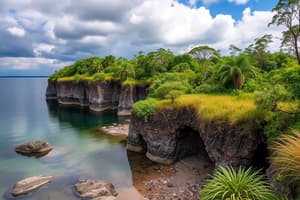Podcast
Questions and Answers
What does the term 'Network of Nature' refer to?
What does the term 'Network of Nature' refer to?
The interconnectivity of ecological systems
Define Biodiversity.
Define Biodiversity.
All the different kinds of life you’ll find in one area
Name the two categories within an ecosystem.
Name the two categories within an ecosystem.
Biotic and Abiotic
List one cause of biodiversity loss.
List one cause of biodiversity loss.
What is pollution in the context of ecosystems?
What is pollution in the context of ecosystems?
Explain what overexploitation refers to.
Explain what overexploitation refers to.
What are some ways to protect and restore biodiversity?
What are some ways to protect and restore biodiversity?
What are the components of Earth's system?
What are the components of Earth's system?
What does democratic intervention refer to?
What does democratic intervention refer to?
What is the origin and meaning of the word 'Democracy'?
What is the origin and meaning of the word 'Democracy'?
Name two fundamental elements of democracy.
Name two fundamental elements of democracy.
What are basic rights and freedoms that are essential in democracy?
What are basic rights and freedoms that are essential in democracy?
What are civil rights?
What are civil rights?
Define freedom of association.
Define freedom of association.
What is libel?
What is libel?
Explain the concept of pluralism.
Explain the concept of pluralism.
What does the dimension of 'representation' in democracy involve?
What does the dimension of 'representation' in democracy involve?
Describe political rights.
Describe political rights.
What is an example of direct democracy?
What is an example of direct democracy?
How is power distributed in a constitutional monarchy?
How is power distributed in a constitutional monarchy?
In which form of government do people elect leaders to act as their representatives?
In which form of government do people elect leaders to act as their representatives?
What does federalism entail in terms of governance?
What does federalism entail in terms of governance?
What is the defining characteristic of despotism?
What is the defining characteristic of despotism?
What is the concept behind socialism in governance?
What is the concept behind socialism in governance?
Flashcards are hidden until you start studying
Study Notes
Network of Nature and Ecosystem
- Interconnectivity of ecological systems and numerous networks
- Geographic area where plants, animals, and other organisms work together to form a bubble of life
- Biotic: living things within an ecosystem (e.g., plants, animals, bacteria)
- Abiotic: non-living physical and chemical components of an ecosystem
Biodiversity
- All the different kinds of life in one area
- Species and organisms work together in ecosystems like an intricate web
- Causes of biodiversity loss:
- Climate Change: changes in air temperature, weather patterns, and sea levels
- Pollution: introduction of contaminants into the natural environment
- Habitat Destruction: massive destruction of natural habitats
- Overexploitation: harvesting a renewable resource to the point of diminishing returns
- Invasive species: non-native organisms that establish themselves and rapidly reproduce within an ecosystem
- Solutions to biodiversity loss:
- Habitat Protection and Restoration
- Support Local Farms
- Climate Change Mitigation
Climate System
- Atmosphere: a mixture of gases that surrounds the Earth
- Lithosphere: the solid, outer part of Earth (including the mantle and crust)
- Hydrosphere: the total amount of water on a planet
- Biosphere: made up of parts of Earth where life exists (all ecosystems)
- Cryosphere: the frozen water part of the Earth system
Democratic Intervention
- Refers to the ways in which a government regulates or interferes with activities or decisions made by individuals or organizations
- Democracy: originated from the Greek words "demos" (by the people) and "kratein" (to rule)
6 Fundamental Elements of Democracy
- Rule of law: no one is above the law
- Separation of power: equal distribution of power for checks and balances
- Basic Rights and Freedoms:
- Human Rights: rights that belong to every person (e.g., right to life, right to be secured in one's person)
- Civil Rights: rights that protect individual freedoms (e.g., right to own property, right to enjoy privileges)
- Political Rights: rights that protect individual freedoms from government infringement (e.g., right to run for elective office, right to suffrage)
- Freedom to worship: the right to worship any God
- Freedom of association: right to join any association
- Freedom of speech
- Pluralism: ensures that citizens can voice their opinions, criticisms, and proposals to the government
4 Dimensions of Democracy
- The people: a collective group of individuals with varying political and religious beliefs
- Equality: equal in the eyes of the law
- Common good: what is good for the people
- Representation: the use of representatives to take actions that benefit the common good
Types of Democracy
- Direct/Pure Democracy: citizens come together to decide on issues or pass laws through a vote
- Indirect Democracy/Representative: people elect leaders to act as their representatives in the government
Other Forms of Government
- Aristocracy: ruled by the nobility
- Capitalism: people are allowed to own property
- Communism: equal distribution of wealth or classless society
- Constitutional Monarchy: ruling power is divided between two heads
- Despotism: government where people are treated as slaves
- Dictatorship: the ruler has the power of the three branches
- Federalism: governing power is shared between a central government and regional/local government
- Monarchy: power is passed down to the monarch's children
- Oligarchy: government is ruled by a few individuals
- Republic: government ruled by a president
- Revolutionary: existing government is forcibly thrown
- Socialism: businesses that involve production and basic utilities are governed by the government
- Timocracy: leaders are chosen by their honor
- Plutocracy: power is held by the wealthy
- Tyranny: ruled by a wealthy person who wields power to rule by overthrowing those who are in power
Studying That Suits You
Use AI to generate personalized quizzes and flashcards to suit your learning preferences.




